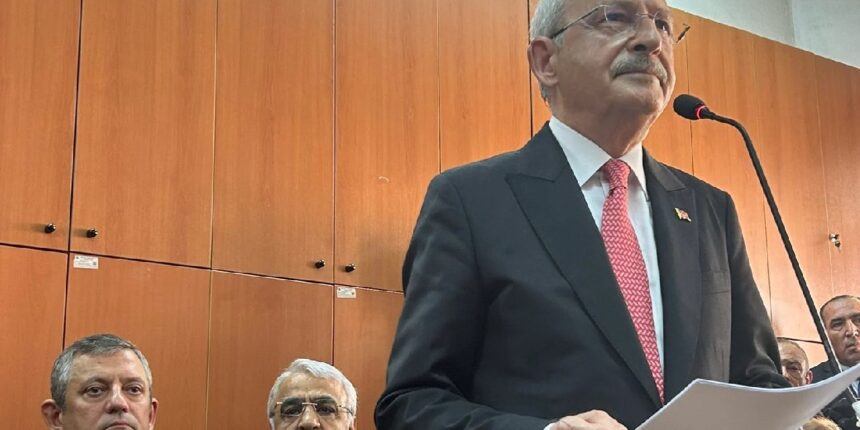Kemal Kılıçdaroğlu, former head of the CHP (Republican People’s Party), was charged with “insulting a public official” and appeared before the Ankara 57th Criminal Court of First Instance. The case has received national and worldwide attention. The allegations originate from his remarks referring to President Recep Tayyip Erdoğan as “Başçalan” (Chief Thief) and “Başhırsız” (Chief Thief), which carry a maximum term of up to 11 years and 8 months in jail and a political ban.
Kılıçdaroğlu defended himself assertively, declaring, “I am here because I called a thief a thief.” He reaffirmed his dedication to combating corruption and ensuring public officials are held accountable. “Throughout my career, I have overseen substantial budgets and supervised numerous employees.” “I have never embezzled public funds, nor have I permitted anyone else to do so,” he stated.
A large number of supporters and important figures from a variety of political groupings were present in the courtroom to demonstrate their solidarity with the defendant. These individuals included the Chairman of the CHP, Özgür Özel, the Mayor of Ankara Metropolitan Area, Mansur Yavaş, the head of the Memleket Party, Muharrem İnce, and the leader of the Zafer Party, Ümit Özdağ. In favour of Kılıçdaroğlu, crowds gathered outside the courthouse, singing slogans in celebration of his victory.
Ahead of the hearing, Kılıçdaroğlu addressed reporters, saying, “I am not here to defend myself but to hold Erdoğan accountable for the corruption he has committed and enabled.” He also criticized the government for suppressing opposition voices, framing the trial as part of a broader effort to limit political dissent.
The origins of this matter may be traced back to the statements made by Kılıçdaroğlu during the aftermath of the corruption investigations that took place in 2013. These investigations involved high-ranking officials and prominent business individuals. The comments he made at the time triggered heated debates in Turkey over the freedom of speech and accountability.
Justice Minister Yılmaz Tunç stated that there are nine active cases and five investigations involving Kılıçdaroğlu, underscoring the independence and impartiality of the judiciary. Opposition leaders and critics contend that the case is politically motivated, intended to suppress one of Erdoğan’s most formidable adversaries.
During his defence, Kılıçdaroğlu also brought up bigger political problems, calling into question the policy of the government regarding Cyprus and making reference to the contentious Broader Middle East Initiative (BMENA). In addition to adding gasoline to the geopolitical discussion, he made the accusation that Erdoğan’s administration was planning to make territorial concessions in Cyprus.
This trial marks a pivotal moment in Turkish politics, with implications for freedom of expression, political accountability, and the upcoming electoral landscape. The court’s ruling, expected in the coming weeks, will likely have a significant impact on the nation’s political trajectory.
For now, Kemal Kılıçdaroğlu remains defiant, stating as he left the courtroom, “The truth will prevail, and I will continue to fight for justice.”



